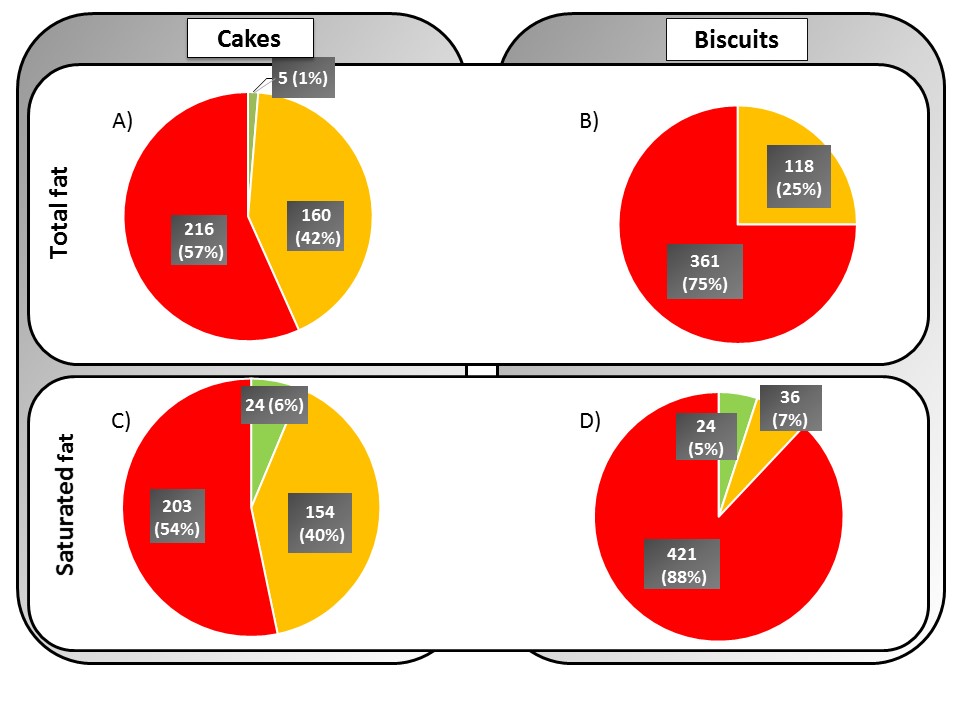New study highlights the need to reduce fat as well as sugar in the main sources of sugar in the UK diet
Click here to view coverage of this study in Food Navigator
A new study by Queen Mary University of London, published in the journal Nutrients (28th May)1 ‘Reformulation and Priorities for Reducing Energy Density; Results from a Cross-Sectional Survey on Fat Content in Pre-Packed Cakes and Biscuits Sold in British Supermarkets’ has highlighted the importance of reducing the fat content of food products to reduce the UK’s calorie intake. The findings indicate that combining sugar and fat reformulation could result in a substantial reduction in calorie content (i.e. energy density), compared to sugar reformulation alone.
Cakes and biscuits
Cakes and biscuits are widely consumed by the British population and are a considerable source of calories, total and saturated fats in addition to sugars. Total and saturated fat contribute significantly to the calorie content of these products. Public Health England’s world-leading sugar reduction programme targets the nine categories of food that contribute the most sugar to a child’s diet, including cakes and biscuits. However, the programme has so far led to minimal sugar and calorie reduction and much more progress is needed in these categories to benefit health. Cakes and biscuits have not been included in PHE’s upcoming Calorie Reduction Programme, which will target savoury products that contribute the most calories to a child’s diet.
Study Findings
The study comprised a cross-sectional survey of the fat content of all available cakes and biscuits from nine UK supermarkets – Aldi, Asda, Lidl, Morrison’s, Sainsbury’s, The Co-op, Waitrose and Marks and Spencer.
More than half of the cakes and more than three-quarters of the biscuits surveyed would receive a red front of pack traffic light label for both fat and saturated fat, according to the criteria set by the Department of Health, indicating that these products are high in total and saturated fat.

Image 1: Percentage of cakes (A,C) and biscuits (B,D) that would receive a low (green)/medium (amber)/high (red) front of pack label for total fat (A,B) and saturated fat (C,D)
There was also a wide variation in both the total fat and saturated fat content within the same categories of cakes and biscuits. For example, in carrot cakes, the total fat content ranged from 5.6g to 29.7 g. Similarly, in rich tea biscuits, the amount of saturated fat per 100 g spanned from 1.2g to 7.2 g. This highlights that reformulation to reduce fat content is entirely possible in this category and if some responsible manufacturers can produce products with less fat, then all must follow their example.
The study also revealed that in both cakes and biscuits, total and saturated fat content were significantly correlated to calories, whereas their sugar content was not. In general, the categories highest in fat were also the highest in calories. Fat reformulation in these products would effectively reduce their calories, leading to a reduced calorie intake in the UK population and contributing to a reduction in obesity levels.
Roberta Alessandrini, lead author of the study and based at Queen Mary University of London, said: “Our study clearly shows that sugar and fat reformulation should be implemented simultaneously in products that are high in fat, sugar and calories. Fruit, vegetables and whole grains, which would provide an additional health benefit to the UK population, could gradually replace the fat and sugar content of these products. Public Health England must include cakes, biscuits and other solid sweet categories in its Calorie Reduction programme”
Graham MacGregor, Professor of Cardiovascular Medicine and Chairman of Action on Sugar, said: “This is a hugely important study. A major public health problem has been neglected by the current childhood obesity plan - fat and sugar reformulation cannot be viewed as two opposing approaches to reduce calories in food, but instead must be implemented simultaneously.
“Foods such as cakes and biscuits are full of excessive calories from saturated fat, leading to overweight and obesity, and are strongly linked to heart disease later in life. It is unacceptable that these manufacturers have been completely let off the hook thus far, when it is clear that they can produce foods with much less fat and calories. The government should call on manufacturers of all fatty foods to act responsibly and reduce their saturated fat content now, before more children are faced with the health consequences.”


